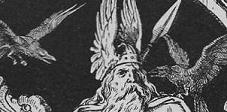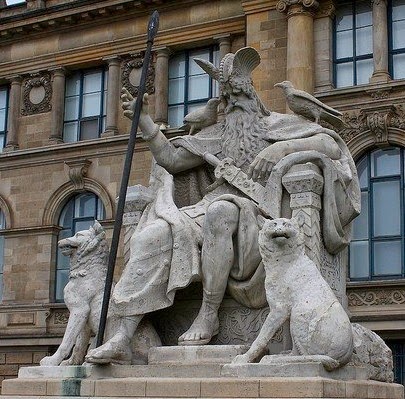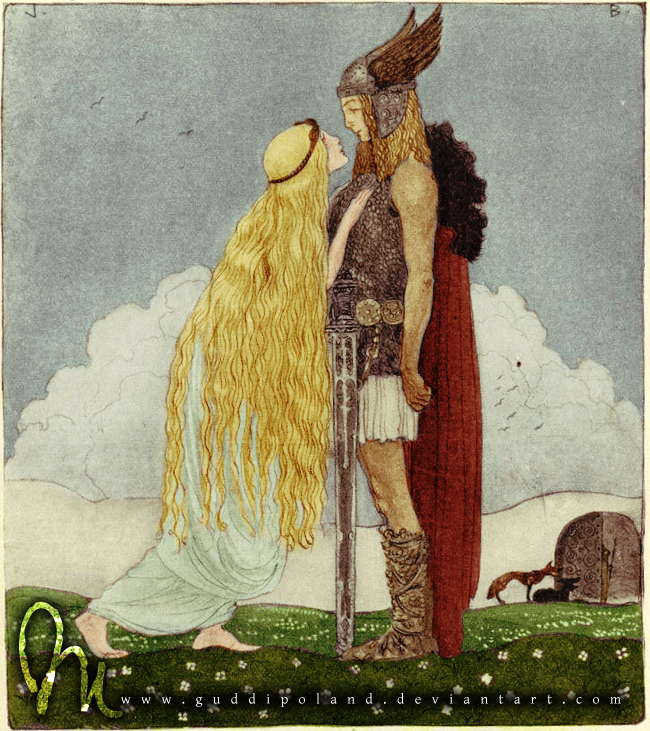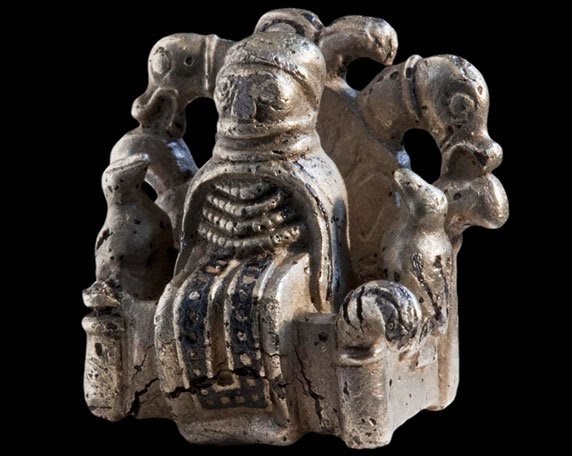The Poetic Edda: A Study Guide
The Speech of the Masked One

[PREVIOUS][MAIN][NEXT]
[HOME]
MS No. 2365 4to [R]
AM 748 I 4to [A]
Normalized Text:
19. Gera ok Freka
seðr gvnntamiþr
hróðigr heria farði;
en við vín eitt
vapngöfugr
Óðinn æ lifir.
19. Gera ok Freka
seðr gvnntamiþr
hróðigr hæria föðr;
en við vín eitt
vapngöfugr
Óðinn æ lifir.
19. Gera ok Freka
seðr gunntamiðr
hróðigr Herjaföður;
en við vín eitt
vopngöfugr
Óðinn æ lifir.
in Icelandic Poetry
“The Song of Grimnir”
The Yale Magazine, Vol. 16
“The Song of Grimner”
XIX. The chief inur'd to toils in war,
Removing from the feast afar,
Bids Gerr and Freker daily eat,
The smoking honors of the treat:
But Odin, great in martial deeds,
With mead, immortal vigor feeds.
Th' illustrious Father of armies, with food
Sateth Gera and Freka; but Odin, great
And noble in arms, liveth on wine alone
in Edda Sæmundar Hinns Frôða
“The Lay of Grimnir”
in Corpus Poeticum Boreale
“The Sayings of the Hooded One”
19. Geri and Freki
the war-wont sates,
the triumphant sire of hosts;
but on wine only
the famed in arms,
Odin, ever lives.
The glorious war-wont Father of Hosts
feeds Greedy and Fierce [his two Wolves]
but the weapon-blessed Woden
lives on wine alone.
in Edda Saemundar
“The Sayings of Grimnir”
in The Poetic Edda
“Grimnismol: The Ballad of Grimnir”
“The rearrangement of
strophes, which is not an attempt at restoration, but made for the sake of
clearness, is indicated by figures in parenthesis corresponding to the strophe
numbering of R.”
23. Glorying, the battle-wont Father of Hosts
feeds Ravener and Greed, his wolves ;
but on wine alone ever Odin lives,
the Weapon-famed god of war.
19. Freki and Geri does Heerfather feed,
The far-famed fighter of old;
But on wine alone does the weapon-decked god,
Othin, forever live.
19. Freki - 'Greedy' and Geri - 'Ravenous'. Heerfather -
Othin.
in The Poetic Edda
“The Lay of Grimnir”
in The Elder Edda
“The Lay of Grimnir”
19. Valfather feeds Freki and Geri30
on the flesh of the fallen;
but weapon-glad Othin on wine only
lives forever and ay.
30 Both names signify "the
Greedy One." They are Othin's two wolves.
19. War-accustomed Warrior-Father
Feeds it to Greedy and Grim,
For on wine alone weapon-good
Odin always lives.
in The Poetic Edda
“Grimnir’s Sayings”
in The Poetic Edda, Vol. III
“The Lay of Grimnir”
19. Geri and Freki, tamed to war, he satiates,
The glorious father of Hosts;
But on wine alone the weapon-magnificent
Odin always lives.
19. His wolves Voracious and
Famished
he feeds to satiety-drilled in war,
famed Father of Armies;
yet on wine alone,
glorious in weapons,
Óðinn always lives.
The Elder Edda: A Book of Viking Lore
'The Lay of Grimnir"
19. ‘Geri and Freki, the war-worn one [Odin] feeds,
that Host-father [Odin] famed of old;
but on wine alone, weapon-fine,
Odin ever lives.

Odin Enthroned
F.W. Engelhardt
COMMENTARY
Snorri quotes and parphrases this verse in Gylfaginning 38:
Then said Gangleri: "Thou sayest that all those men who have fallen in battle from the beginning of the world are now come to Odin in Valhall. What has he to give them for food? I should think that a very great host must be there." Then Hárr answered: "That which thou sayest is true: a very mighty multitude is there, but many more shall be, notwithstanding which it will seem all too small, in the time when the Wolf shall come. But never is so vast a multitude in Valhall that the flesh of that boar shall fail, which is called Sæhrímnir; he is boiled every day and is whole at evening. But this question which thou askest now: I think it likelier that few may be so wise as to be able to report truthfully concerning it. His name who roasts is Andhrímnir, and the kettle is Eldhrímnir; so it is said here:
Andhrímnir has in Eldhrímnir
Sæhrímnir sodden,
Best of hams; yet how few know
With what food the champions are fed."
Then said Gangleri: "Has Odin the same fare as the champions?" Hárr answered: "That food which stands on his board he gives to two wolves which he has, called Geri (Ravener ) and Freki; (Glutton, greedy) but no food does he need; wine is both food and drink to him; so it says here:
Geri and Freki the war-mighty glutteth,
The glorious God of Hosts;
But on wine alone the weapon-glorious
Odin aye liveth.
Odin feeds the meat set before him to his wolves. In skaldic poetry, “the food of wolves” is a kenning for fallen warriors (as are the paraphrases 'food of ravens', 'food of eagles', etc.) . There are numerous examples of kennings of this type.
Using poetic metaphor, the boar that feeds the men of Valhalla, is likened to the warriors themselves. Odin gives this meat to his wolves. Fallen warriors are 'the food of wolves". Fallen warriors "feed" the Einherjar, i.e. increase their numbers. In support of this interpretation, boar imagery surrounding warriors is pan-Germanic in nature from the earliest to the latest heathen records. Here are a few examples:
In Germania 45, Tacitus writes:
45. … the Aestii, who have the religion and general customs of the Suebi, but a language approximating to the British. They worship the Mother of the gods. They wear, as emblem of this cult, the boar which stands them in stead of armour or human protection and ensure the safety of the worshipper even among his enemies.
In Beowulf, the boar (eofor) is used as a helmet ornament. Here, the fallen warrior Hnaef, lying on his funeral pyre is described by the boar-décor on his armor, as if the boar himself were going to roast on the fire.
Ad wæs geæfned ond icge gold
ahæfen of horde. Herescyldinga
betst beadorinca wæs on bæl gearu.
1110
æt þæm ade wæs eþgesyne
swatfah syrce, swyn ealgylden,
eofer irenheard, æþeling manig
wundum awyrded; sume on wæle crungon.Of the martial Scyldings the best of warriors
on the pile was ready: at the heap was
easy to be seen the blood-stain'd sark,
the swine all golden, the boar iron-hard,
many a noble with wounds injur'd,
(some had in the slaughter fall'n).
Snorri informs us that Frey rides a boar to Balder’s funeral, which he derived from the ninth century skaldic poem Húsdrápa. Snorri also informs us that Freyja is called Syr (sow) and even as late as late Eddic heroic poetry, the boar is considered sacred. At Yuletide, warriors lay their hands on the “sonar-galt” (sacrificial boar) and take solemn oaths on the “Bragi cup” to complete some feat in the coming year.
Helgi Hjorvardsson, prose between verses 30-31:
"King Helgi was a renowned warrior. He came to King Eylimi and demanded his daughter Svava. Helgi and Svava were united, and loved each other ardently. Svava remained at home with her father, but Helgi was engaged in warfare. Svava remained at home with her father, but Helgi was engaged in warfare. Svava was a Valkyria as before. Hedin was at home with his father, King Hiörvard in Norway. Returning home alone from the forest on a Yule-eve, Hedin met a troll-wife riding on a wolf, with serpents for reins, who offered to attend him, but he declined her offer; whereupon she said: “Thou shalt pay for this at the Bragi-cup.” In the evening solemn vows were made, and the són-hog was led forth, on which the guests laid their hands, and then made solemn vows at the Bragi-cup. Hedin bound himself by a vow to possess Svava, the beloved of his brother Helgi."
By feeding this meat, obtained from Saehrimnir, to his wolves, Odin is symbolically equating Saehrimnir’s meat with fallen warriors, “the food of wolves”. The meat which “feeds/begets” the Einherjar is thus human flesh, the “best of bacons.” The more fallen human warriors on the battlefield, the more food for the wolves, and so the more heroes in Valhall.
This and the previous strophe thus equate human flesh with the ever-renewing flesh of the boar Saehrimnir which feeds the Einherjar. Like the Einherjar themselves, the boar is slain each day only to reappear whole for slaughter the next. The human being is symbolically equated with the sacrificial pig, thus explaining boar symbols in part throughout Germanic iconography.

WOLVES AT THE DOOR
FJÖLVINNSMÁL stt. 13-16
We come face
to face with Odin’s wolves in another Eddic poem, Fjölsvinsmál. Here, Odin is
Fjölsviðr (cf. Grímnismál 48), the watchman, who interrogates the hero
Svipdag as he approaches a mysterious castle gate in search of his beloved
Menglad:
13:1 Segðu mér það, Fjölsviður,
13:2 er eg þig fregna mun
13:3 og eg vilja vita:
13:4 hvað þeir garmar heita,
13:5 er gífrir rata
13:6 og varða fyr lundi lim?
Now tell me, Fjolsvith,
what I will ask you
and what I wish to know:
who are these greedy hounds,
who pace back and forth,
guarding the tree's foliage?
14:1 Gífur heitir annar,
14:2 en Geri annar,
14:3 ef þú vilt það vita;
14:4 varða ellilyf
14:5 æ þeir varða,
14:6 unz rjúfast regin.
One is named Gifur,
the other Geri,
if you want to know;
the guardians' old-age remedy
they will ever keep safe
until the gods perish.
Svipdagur kvað:
Svipdag said:
15:1 Segðu mér það, Fjölsviður,
15:2 er eg þig fregna mun
15:3 og eg vilja vita:
15:4 hvort sé manna nökkuð,
15:5 það er megi inn koma,
15:6 meðan sókndjarfir sofa.
Now tell me, Fjolsvith,
what I will ask you
and what I wish to know:
whether any man
may slip inside,
while the fierce ones sleep?
Fjölsviður kvað:
Fjolsvith said:
16:1 Missvefni mikið
16:2 var þeim mjög of lagið,
16:3 síðan þeim var varsla vituð;
16:4 annar um nætur sefur,
16:5 en annar um daga,
16:6 og kemst þá vætur, ef þá kom.
Opposite sleeping schedules
were strictly imposed on them,
when they were appointed guards;
one sleeps by night,
the other by day;
thus no one can get through.
Grímnismál 19 names Odin's two wolves, Geri and Freki. In Fjölsvinnsmál, we learn that Fjölsviðr's two garmar are named Geri and Gífur. The meaning of an adjective "gífur" is practically synonomous to the meaning of the name Freki, "the greedy one". The identity of these wolf-hounds should be obvious: Fjölsviðr's two wolves, Gífur and Geri, are Odin's two wolves, Freki and Geri. It should also be mentioned that in Grímnismál 10 we find a wolf (vargur), and an eagle guarding the door to Odin's hall. Carrion-eaters (including ravens) are animals sacred to Odin.
Lines 13:5-6 are utterly incomprehensible. In lieu of the usual emendations suggested by Bugge, and subsequently followed by most editors, Ólsen's intelligent commentary has been adopted here.
Line 14:4 which reads varðir ellifu in all manuscripts, can only mean "eleven women"; varðir being the plural of the rare word, vörð, "woman." This would indicate that the wolves guard "eleven women". But even if we accept this reading, the sentence does not make sense syntactically. Thus, most (if not all) commentators have suggested emendations here. Rask emended the sentence to read varðir ro (eru) ellifu, "eleven are the women, whom they guard". But who are these eleven women?
Traditionally, the Aesir were twelve in number. The first stanza of the so-called shorter Völuspá (Völuspá in skamma), incorporated within Hyndluljóð, states: Voru ellefu / æsir taldir / Baldur er hné / að banaþúfu, "the number of the Aesir was reduced to eleven, when Baldur died". This is also found in Snorri's Edda. Therefore, it may be assumed that there were also twelve Ásynjur. If the gate guarded by the wolves is Valgrind, the front gate of Asgard, then the "women", who dwell inside, must be the Ásynjur. When Nanna died of grief for Baldur, their number also would have been reduced by one. Thus the eleven women mentioned in Fjölsvinnsmál might refer to the remaining Ásynjur. Other emendations have been suggested.
Grundtvig suggested this phrase be emended to varðir ellilyfs, and that the epli ellefu, the eleven apples, of Skírnismál 19-20 be emended to epli ellilyf. The word ellilyf otherwise occurs only in Haustlöng 9:3 in the phrase ása ellilyf, "the Aesir's remedy against old age", i.e. Idunn's apples. Björn M. Ólsen took Grundtvig's suggestion one step further, suggesting that this line in Fjölsvinnsmál be read varða ellilyf, "the guardians' remedy against old age". This would make sense, since the Aesir are the guardians of creation. Ólsen's suggestion has been adopted in the present translation, because it is in accordance with the emendation of 13:5-6 (also based on Ólsen) og varða fyr lundi lim, "and, in front of the tree, guard its foliage". From the context of the poem it is apparent that Svipdag sees an enormous tree within the walls (see stanza 19 ff.). This tree is truly precious and needs to be diligently guarded. Its leaves seem to have medicinal properties, and its fruits (apples) are the Aesir's remedy against old age (ellilyf).
The "fierce assailants", of course, are the two wolves guarding the gate. Svipdag is attempting to enter Asgard. Since the gate is guarded by two wolves, he considers the possibility of evading them while they sleep. Line 16:6 is garbled, but the meaning is obvious. Bugge tentatively suggested the emendation: og kemst því vætur, ef þar kemur, which seems reasonable.
If there is any doubt that the Fjölsvidr of this poem is intended to be Odin, see strophe 45:
Menglöð kvað:
45:1 Horskir hrafnar
45:2 skulu þér á hám gálga
45:3 slíta sjónir úr,
45:4 ef þú það lýgur,
45:5 að hér sé langt kominn
45:6 mögur til minna sala.
Wise ravens
shall tear out your eyes
on the high gallows,
if you are lying,
that from afar has arrived
the youth to my halls.
Despite the fact that few things are called by their common names in this poem, Menglad's threat to Fjolsviðr makes it clear who she is actually speaking to. Her response is clearly a riddle with one inescapable solution. The word horskir means "wise, sagacious" and the word is certainly well-placed here. There are two ravens in the mythology, who clearly can be said to be wise, i.e. Huginn (Mind) and Muninn (Memory). They fly over Jörmungrund every day gathering information for Odin (Grímnismál 20). They are his "intelligence" in more than one sense. One of Odin's appellations is Hrafnás, Hrafnagoð, Raven God. Odin is also well-known as the God of Gallows. He is Hangagoð, Hangatýr, the Hanged God, who hung for nine nights on the "windswept tree" (Hávamál 138). He is the one-eyed god, who gave half his sight in exchange for wisdom from Mímir's well (Gylfaginning 15, Völuspá 28). These facts would have been well- known to the poem's audience, who must have delighted in solving the puzzle.
Menglad's riddle is thus transparent. When she says "Wise ravens shall tear out your eyes on the high gallows", she can only be referring to Odin.

Odin on Hildskjalf
figurine from Lejre, Denmark
[PREVIOUS][MAIN][NEXT]
[HOME]